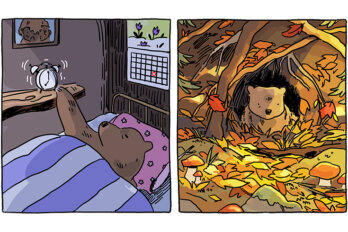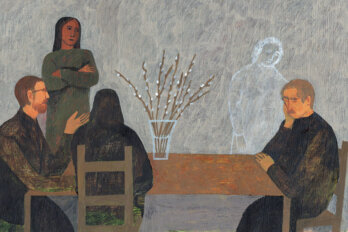One thing about the March/April issue of The Walrus seemed certain when we started creating it: it should reflect a sense of optimism. Vaccination numbers continued to tick upward, and cities had started opening up. Our editorial priority for 2022 was to explore the next phase of recovery from the pandemic, in Canada at least.
Of course, the biggest story at the beginning of this year was the raging Omicron variant. To speak of optimism when so many were ill and otherwise affected seemed inappropriate. But it didn’t feel adequate to simply restate all the difficulties of living in a pandemic. You already know them. If anything, the pandemic’s latest turn introduced a need for more complex responses than evaluating whether the glass is half full or half empty.
Life isn’t fair. It’s one of the most basic lessons we learn, yet it’s one we struggle to accept. Lockdowns are hard, especially if we’ve already done our part to follow public health measures like masking, physical distancing, and vaccination. School closures are difficult, and they affect the people who have perhaps the least control over the virus’s spread—kids. The ongoing toll of this outbreak on our health care system feels unjust. It’s also frustrating that so many of us have to keep up the pretence of business as usual—parenting and doing our jobs and being good citizens—in the midst of tremendous social consequences and our own anxiety. The widespread outbreak many of us feared is upon us, yet here we are, still showing up every day. What to do with that?
The pandemic has made philosophers of us all and revealed some interesting new coping strategies. Whether intentionally or not, in this issue our contributors have presented a range of responses to adversity, from Nathan Whitlock’s detailed and droll reporting, in “Inside Hamilton’s Sewergate Scandal,” on a sewage leak in the city’s fresh water, to the more contemplative. Anne Thériault’s first-person account of learning to cook with meal kits (“What’s Cooking?”) takes a lighter approach to the lessons of living in lockdown—if life keeps handing you lemons, maybe it’s time to squeeze out a new definition of success.
Not all the stories in this issue are about COVID-19. One of the most enigmatic narratives is by Jennifer Robertson, widow of late Bitcoin entrepreneur Gerald Cotten. In “Confessions of a Bitcoin Widow,” a memoir adapted from her new book co-authored with journalist Stephen Kimber, a picture emerges of Robertson’s husband through the shocking details of his financial entanglements. The story is about how sequential revelations force a person to confront the fact that the life they knew—or thought they knew—was not authentic. Perhaps most surprising is Robertson’s own reaction to her dramatically changing circumstances.
History offers many lessons about the value of endurance. Perhaps that’s why stories of action and engagement speak to us these days. At a time when all of us are concerned about the state of hospitals, Wendy Glauser’s cover story, “Divine Intervention,” adds to an ongoing conversation about the Catholic Church’s role in some of this country’s most prominent medical institutions. The findings from her interviews with staff and patients at Catholic hospitals—who are divided over the ethics of certain procedures—cast light on the role of health care workers in patient advocacy.
On a bad day, we can focus on the preciousness of life itself. That is the insight, for me, of a poem by Lorna Goodison, the first Canadian winner of the Queen’s Gold Medal for Poetry, in 2019, and a former poet laureate of Jamaica. In “Quasheba’s Lament,” published in this issue, an enslaved woman awaiting freedom works to
and there is hope while there is life.
If there were ever a reminder that life is unequal and that many of us enjoy relative privilege, this is it. Goodison’s words help us understand the humanity of anyone in pain and see our existence for what it is: a gift. The urge to write isn’t always rooted in optimism. Sometimes it’s a cry for help or a defiant statement of survival. What storytelling does particularly well is illustrate what others are experiencing and how they are coping. With that in mind, we hope this issue offers you companionship in the coming days.





